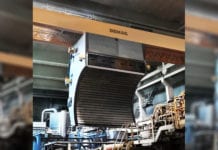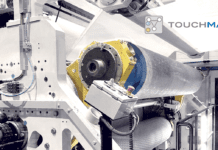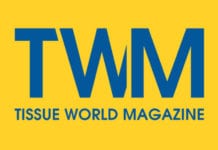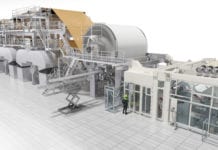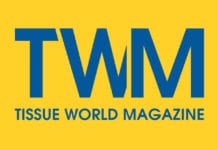(News from RISI) – Out of the one million tonnes/yr of new tissue paper capacity coming online in China this year, APP China probably accounts for around 30%.
Since late last year, the company has commissioned four large tissue machines (two each at its Suzhou plant in Jiangsu province and the Xiaogan mill in Hubei province) and two medium-sized PMs at the Yangpu complex in Hainan province.
Each of the four larger PMs has a width of 5.6m and an operating speed of around 2,000m/min, with a capacity of 60,000tpy.
All four machines were provided by A Celli, with Steel Yankees manufactured by other European suppliers such as Andritz.
The two smaller 2.8m-wide PMs were assembled by APP China’s subsidiary, Jinshun Machinery. Each has a capacity of 27,000tpy.
The startup of the six machines, which have a combined capacity of 294,000tpy has taken APP China’s total tissue capacity to 1.4 million tonnes/yr, the largest in the country.
The one million tonne/yr of new Chinese capacity figure is from the latest statistics compiled by the China National Household Paper Industry Association (CNHPIA).
The association estimated that the country’s tissue capacity may rise to 10.44 million tonnes/yr by the end of this year, up by 10.6% from 9.44 million tonnes/yr in 2014.
But the Chinese market can only handle some half a million tonnes/yr of net new capacity annually, according to the CNHPIA.
And the country is already been overburdened with a surplus following rapid tissue expansion in the past several years, which has led to stagnant pricing and dwindling profitability.
An APP China senior executive said: “We are aware that the domestic market is saturated and is unable to absorb any new capacity. However, we still have to finish those projects that have been developed and are under construction.”
A few years ago, when the Chinese tissue industry was the last sector where the profit margins were particularly attractive, a number of firms entered the sector. Many of them had no background in the industry.
Such bandwagon-jumping has resulted in an explosion of new capacity.
APP China played a leading role in the phenomenon.
But the swamped market has been forcing the company to radically slow down its aggressive expansion plans since early last year.
The APP contact said: “I believe there are hidden agendas in the investments. Many firms aimed to obtain land use rights and low-interest bank loans, which can be secured when an expansion plan is approved by the government.
“I believe a big fraction of such projects in the pipeline will not get started in the end.”
At APP China’s Suzhou mill, two 60,000tpy tissue machines have been delivered to the site by Valmet.
With no clear view of when the overcapacity issue will be resolved, the firm is not sure when the two units will be erected.
New tissue mill in Sichuan: In China’s south western province of Sichuan, APP China is building a greenfield tissue facility at Suining city.
The company has kicked off installation work for a 60,000tpy A Celli PM at the plant, with startup expected by the end of this year.
The new Suining mill, along with the Xiaogang facility in central China, are part of APP China’s plan to tap into the country’s inland market.
Investments there are also aimed at spreading out the company’s production bases nationwide.
Its oldest plant is located on China’s southeast coast in Suzhou, while in Hainan, the country’s southernmost island, it operates the massive integrated Yangpu complex.
The Yangpu mill runs a 1.8m tpy bleached hardwood kraft pulp line, a 1.6m tpy coated fine paper machine, and 26 tissue machines that have a combined capacity of almost 800,000tpy.
While there is no room for new machines at the Yangpu facility, APP China has planned for further expansions at its Suining, Xiaogan and Suzhou sites.
The company reckons that ongoing rapid urbanization will continue to boost demand for tissue products, such as toilet paper, as people move into apartments with flush toilets.
It also believes that as many current investment projects will end up being shelved due to the harsh market situation, when the country’s economy sees improvement, it will be well positioned to meet the next wave of demand growth.























